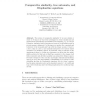Free Online Productivity Tools
i2Speak
i2Symbol
i2OCR
iTex2Img
iWeb2Print
iWeb2Shot
i2Type
iPdf2Split
iPdf2Merge
i2Bopomofo
i2Arabic
i2Style
i2Image
i2PDF
iLatex2Rtf
Sci2ools
LPAR
2005
Springer
2005
Springer
Comparative Similarity, Tree Automata, and Diophantine Equations
The notion of comparative similarity ‘X is more similar or closer to Y than to Z’ has been investigated in both foundational and applied areas of knowledge representation and reasoning, e.g., in concept formation, similarity-based reasoning and areas of bioinformatics such as protein sequence alignment. In this paper we analyse the computational behaviour of the ‘propositional’ logic with the binary operator ‘closer to a set τ1 than to a set τ2’ and nominals interpreted over various classes of distance (or similarity) spaces. In particular, using a reduction to the emptiness problem for certain tree automata, we show that the satisfiability problem for this logic is ExpTime-complete for the classes of all finite symmetric and all finite (possibly non-symmetric) distance spaces. For finite subspaces of the real line (and higher dimensional Euclidean spaces) we prove the undecidability of satisfiability by a reduction of the solvability problem for Diophantine equation...
| Added | 28 Jun 2010 |
| Updated | 28 Jun 2010 |
| Type | Conference |
| Year | 2005 |
| Where | LPAR |
| Authors | Mikhail Sheremet, Dmitry Tishkovsky, Frank Wolter, Michael Zakharyaschev |
Comments (0)

